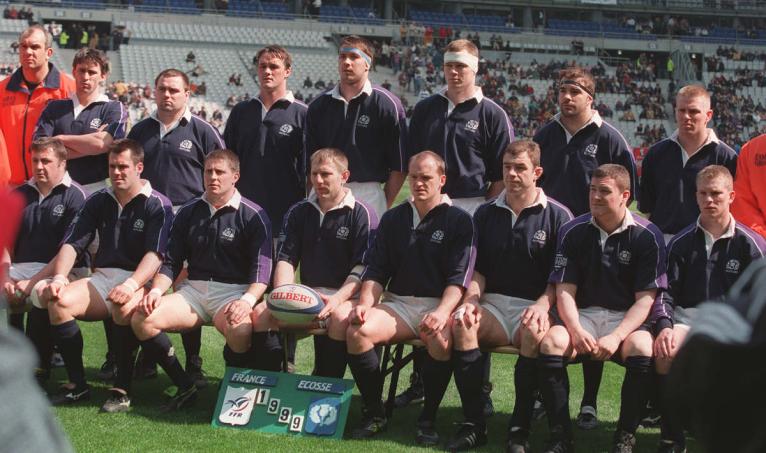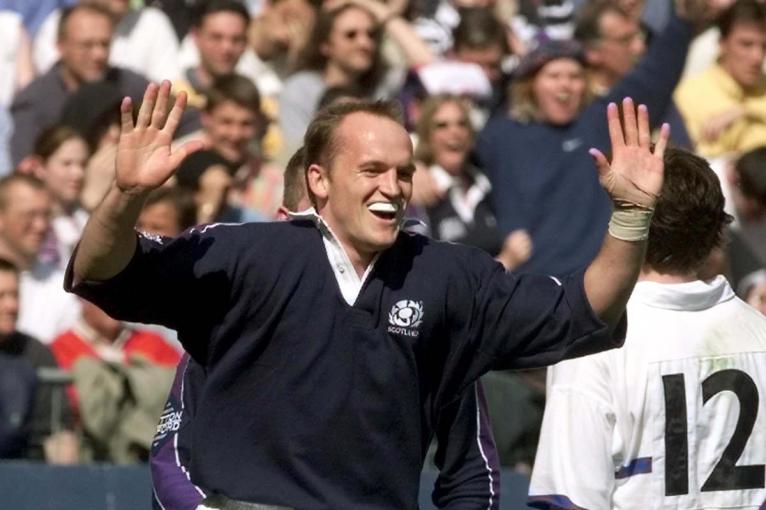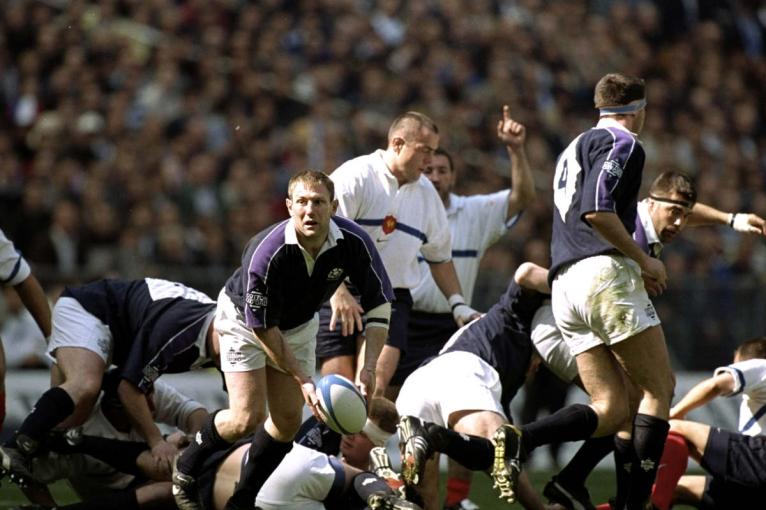A squad of Scotland legends will come together at Murrayfield on Saturday with their eyes firmly focused on a Calcutta Cup victory.
As much as Finn Russell, Rory Darge et al may one day hope to be termed in the legendary class, there is a key difference between the team that takes to the field bidding to claim a remarkable fourth successive Championship victory over England – only achieved once before, from 1893-96 – and the one that takes its seats for kick-off in the West Stand.
There will sit most of the ‘Class of 99’, the squad that won the last Five Nations Championship just under 25 years ago.
Gary Armstrong was the captain, and outside the scrum-half that day was Gregor Townsend, John Leslie, Alan Tait, Cammie Murray, Kenny Logan and Glenn Metcalfe. Up front, Dave Hilton, Gordon Bulloch and Paul Burnell were the front row; Scott Murray and Stuart Grimes teamed up at lock; and the back row was Martin Leslie, Budge Pountney and Stuart Reid at No.8, the latter playing his first Five Nations match after an injury to Eric Peters.

“It wasn’t the team selected at the start of the championship – I can remember that much!” laughs Armstrong, looking forward to this weekend’s meet-up with old friends at Murrayfield organised by the team’s former media manager Graham Law.
“It was a funny thing that people look back on us as legends, and I suppose we have become that because we’re the last Scotland team to win anything, but injuries and selection changes put that team together. You look at it now, with Gregor at 10, Leslie at 12, Taity at 13 and Glenn at full-back, and think that team was made for attacking rugby and it was no surprise we won… but that wasn’t what many people were thinking at the time!”
In fairness, the team came pretty close to claiming only a fourth Scottish Grand Slam.
You can coach attacking play, but the reality is you need to have players who want to attack. We had them across the team that year, and not just in the backs, and I’d say we have that again now
Duncan Hodge started the championship at stand-off, but having notably switched the opening day kick-off to send John Leslie streaking down the touchline for a 10-second try against Wales, shortly after half-time he suffered a broken leg.
Tom Smith, Doddie Weir, Peter Walton and Eric Peters all started against Wales but didn’t make it to the starting line-up in Paris, where Scotland thought they were playing for second place. They had comfortably defeated Wales and Ireland, racking up the tries, and were cursing their luck after losing 24-21 to England at Twickenham, with Kenny Logan sending three penalty kicks wide of the uprights.
Townsend will not be sitting with his former teammates, of course, as he takes his place in the coaches’ box, but his role then as the orchestrator of the Scottish attack on a gloriously sunny day in the Stade de France – emulating Johnnie Wallace’s 1925 record of scoring a try in every championship game – and in shaping a more competitive team now is intriguing.

“There are definitely similarities from then to now,” acknowledges Townsend. “You can coach attacking play, but the reality is you need to have players who want to attack. We had them across the team that year, and not just in the backs, and I’d say we have that again now. Finn [Russell] is an obvious talent, but we have players across this side who love to find space and play.
“There was also an age profile in that ’99 team, with Gary and Taity in their 30s, and while I wasn’t ‘old’, I was getting towards the second half of my career, so there was an experience and a confidence there. I see that in the current group too. Individually, they know their own games and they understand the game better now too.
“As coaches it’s always about bringing out the best in the players, but for Scotland that tends to be about playing the game at pace and with movement. That was how we played then, and it’s no secret that that’s how I want us to play now.
I wouldn’t have believed then that we would still be trying to win the Six Nations 25 years on. But it just shows how hard it is for Scotland to do it.
“The game hasn’t changed that much. Speed and playing to your strengths is just as important. This team is far more skilful than we were in ’99, but even going back to 1990 [Grand Slam], when you saw Scotland playing it was about players creating quick ball at rucks. We always have to play the game with speed, and it may be tougher with better defences these days, but I still believe that attack always has the upper hand on defence. There is always space on a rugby field, and there are ways of getting quick ball from contacts and then it’s about finding that space.
“That’s how we’ll be guided this weekend, but, of course, you’ve got to balance how you want to play with the experience of how to win a game, whether that’s playing to the weather or adapting when certain plans haven’t come off. But, just as we had to do that in ’99, that’s something this team has learned to do, certainly from the World Cup.”
Armstrong, Scotland’s scrum-half in both the Grand Slam victory of 1990 and ’99 success, agrees.
“In truth we didn’t realise how big a deal it was to win the last Five Nations title, and I wouldn’t have believed then that we would still be trying to win the Six Nations 25 years on. But it just shows how hard it is for Scotland to do it. They’ve beaten everyone in the championship over the last few years, but doing it over five games is not easy – even if Ireland made it look like it is!”

Armstrong adds: “Another thing that was the same in ’99 and ’90 was the tightness of the squad. I don’t know about the current squad but I know Gregor has done a great job as a coach. In ‘90 and ‘99, we were teams that would almost die for each other. We went into battle with nobody really giving us a chance, so we had to build our own belief – and we did.
“We should have beaten England at Twickenham, and that would have been another Slam, but when we got to Paris everyone thought we’d get stuffed and that England would beat Wales the next day.
“We got a wee favour when [Thomas] Castaignede had to go off injured after France scored just three minutes in, because he was a great talisman for them, but we had great belief in that team and we just attacked, and everything we tried seemed to come off.
“We scored five tries in the first 20 or so minutes, and I seemed to spend most of my time looking up to see another team-mate running in behind the posts, and then running back to our half! It was surreal.
Kenny told us why he’d missed an easy conversion in front of the posts in Paris… because he was watching himself on the big screen as he was running up to take the kick! Kenny’s always loved the TV!
“They came back at us but our defence in the second half was first-class too and the half finished 3-0 to us – and 36-22 overall.
“And then after a good night out, we’re all getting home on the Sunday, and Gibbsy [Scott Gibbs] is off dancing round England players at Wembley on the Sunday with us all home or travelling home. He’s now an honorary Scot! That gave Wales a one-point win and hands us the title, and not even the Five Nations committee were ready for that. We had to pitch up at Murrayfield on the Monday night to receive the trophy, but 15,000 supporters turned up to see it. That was strange.
“I’m looking forward to this weekend. We’ve lost a couple of boys since then, sadly, my big mate Doddie and our wee silent assassin, Tom Smith – tremendous players who were big parts of that season. We’ll have a drink to them. And we’ll have some laughs, because you look back now and realise we created some memories. Not least when Kenny told us why he’d missed an easy conversion in front of the posts in Paris… because he was watching himself on the big screen as he was running up to take the kick! Kenny’s always loved the TV!”



Comments
Join free and tell us what you really think!
Sign up for free